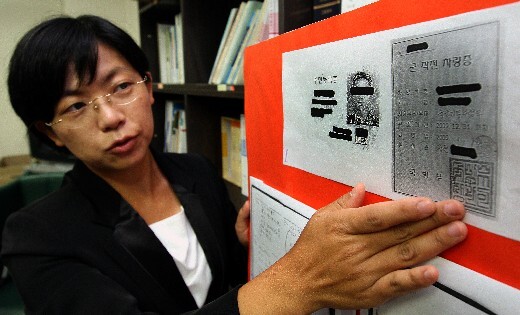hankyoreh
Links to other country sites 다른 나라 사이트 링크
DSC resumes spying on civilians

Allegations have been presented charging the Defense Security Command (DSC) with conducting a large-scale illegal investigation into nonmilitary activities. If the allegations turn out to be true, a controversy is anticipated over the reemergence of using the military to engage in domestic intelligence activities, including keeping surveillance on citizens’ private lives.
In a press conference held at the National Assembly on Wednesday, Democratic Labor Party (DLP) Lawmaker Lee Jung-hee stated, “The shocking fact has come to light that the Lee Myung-bak government is using the DSC to investigate a large number of civilians.” Lee claims that the DSC “these systemic investigations involves a great deal of expense and several agents.”
Lee disclosed items discovered on the person of a captain affiliated with the DSC, identified by the surname of Shin, as evidence. The captain had been present at the scene of an Aug. 5 assembly in Pyeongtaek protesting police suppression of the Ssangyong Motors labor union strike. Lee presented the press with video recordings, identification, a military operations vehicle certificate, and a pocket notebook containing the DLP’s activity plan that had been in Shin’s possession.
The notebook contains detailed information on the recorded activities of civilians between Aug 1 and 7 that have no direct connection with the military, including DLP party officials and members of civic and social groups. For example, the information in the notebook includes details recorded about an individual under investigation who purchased undergarments at a market, ate bulgogi and naengmyeon at a restaurant, and went to a noraebang late at night. The recorded information suggests that a system of 24-hour surveillance was in put into effect.
Footage from the video camera also suggest the targets of the investigation were being tailed persistently throughout their daily activity, and includes documentation of the apartment and office of a DLP official and shots of subjects waiting for the bus. “Sixteen names appear in the notebook, and seven of them, including one DLP official, are confirmed civilians,” said Lee.
The notebook also contains details that raise the question of whether the civilian investigations were conducted with police cooperation. The words “police accompaniment beginning next week” and “CCTV installation” are written into a memo on July 24 under the title “Discussion.” A memo on May 11 contains an organized list of expenses: “Difficulty entering and exiting luxury apartment in small car, reflect in mid- to long-term budget,” “Bring in microbus loaded with necessary equipment,” and “Secure position using housing deposit funds.”
Lee said that the DSC “is not permitted to collect intelligence on civilians or investigate civilians except in special circumstances, such as when a civilian’s personal data is needed in connection with military security or military counterespionage.”
“According to Article 44 of the Military Court Act, following and photographing people unconnected with the military is an illegal act that goes outside the scope of the DSC’s duties,” Lee added. Lee is calling for a stern reprimand be given to those responsible for the illegal investigations and that the full story be brought to light.
In response, a DSC official says that the captain who was in possession of these items “went to investigate the assembly in front of the Ssangyong Motors Pyeongtaek plant because there was a possibility that a soldier who has been under investigation for violating the National Security Law might have visited there during his leave.” The official also explained that the notes regarding civilians’ activities do not confirm “investigations into civilians, but instead a process of confirming intelligence about crimes connected with the military.”
The DSC originally went by the name of Boansa (Army Counter-Intelligence Corps). It was changed to the Gukgun Gimu Saryeongbu (DSC) following a press conference held in 1990, during which Private Yoon Sok-yang revealed that the Boansa was keeping 1,300 civilians, including nonmilitary government personnel and opposition party politicians, under regular surveillance.
Please direct questions or comments to [englishhani@hani.co.kr]
Editorial・opinion
![[Editorial] Penalties for airing allegations against Korea’s first lady endanger free press [Editorial] Penalties for airing allegations against Korea’s first lady endanger free press](https://flexible.img.hani.co.kr/flexible/normal/500/300/imgdb/original/2024/0502/1817146398095106.jpg) [Editorial] Penalties for airing allegations against Korea’s first lady endanger free press
[Editorial] Penalties for airing allegations against Korea’s first lady endanger free press![[Editorial] Yoon must halt procurement of SM-3 interceptor missiles [Editorial] Yoon must halt procurement of SM-3 interceptor missiles](https://flexible.img.hani.co.kr/flexible/normal/500/300/imgdb/child/2024/0501/17145495551605_1717145495195344.jpg) [Editorial] Yoon must halt procurement of SM-3 interceptor missiles
[Editorial] Yoon must halt procurement of SM-3 interceptor missiles- [Guest essay] Maybe Korea’s rapid population decline is an opportunity, not a crisis
- [Column] Can Yoon steer diplomacy with Russia, China back on track?
- [Column] Season 2 of special prosecutor probe may be coming to Korea soon
- [Column] Park Geun-hye déjà vu in Yoon Suk-yeol
- [Editorial] New weight of N. Korea’s nuclear threats makes dialogue all the more urgent
- [Guest essay] The real reason Korea’s new right wants to dub Rhee a founding father
- [Column] ‘Choson’: Is it time we start referring to N. Korea in its own terms?
- [Editorial] Japan’s rewriting of history with Korea has gone too far
Most viewed articles
- 160% of young Koreans see no need to have kids after marriage
- 2[Editorial] Penalties for airing allegations against Korea’s first lady endanger free press
- 3Months and months of overdue wages are pushing migrant workers in Korea into debt
- 4Bills for Itaewon crush inquiry, special counsel probe into Marine’s death pass National Assembly
- 5[Reporter’s notebook] In Min’s world, she’s the artist — and NewJeans is her art
- 6[Guest essay] Maybe Korea’s rapid population decline is an opportunity, not a crisis
- 71 in 3 S. Korean security experts support nuclear armament, CSIS finds
- 8S. Korea discusses participation in defense development with AUKUS alliance
- 9Cracks found in containment building of UAE nuclear power plant built by S. Korean companies
- 10At heart of West’s handwringing over Chinese ‘overcapacity,’ a battle to lead key future industries